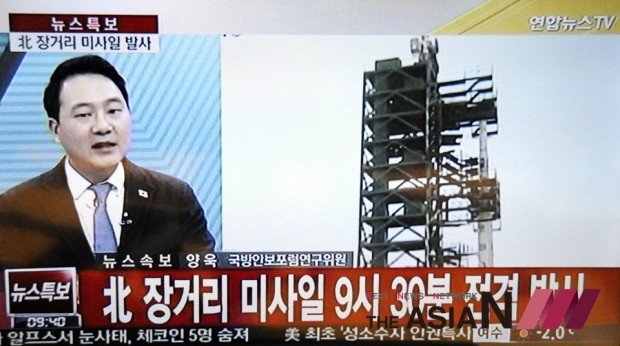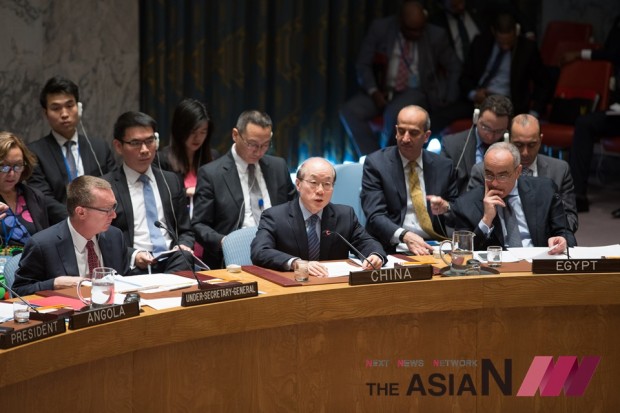Pyongyang’s acts increase tensions in the region

A video grab taken on Feb. 7, 2016 from South Korean TV shows the news report on the launch of a long-range rocket by the Democratic People’s Republic of Korea (DPRK), in Seoul, South Korea. The DPRK on Sunday launched a long-range rocket as planned, Yonhap news agency reported citing South Korea’s defense authorities. (Photo : Xinhua)
The international community was disturbed and taken aback by North Korea’s hydrogen bomb test in early January this year. The test was not only threatening the security and the peace of the Korean Peninsula but also the region and world at large.
Malaysia is very concerned about this international issue even though it is not a “nuclear programme” nation. Malaysia condemned North Korea’s hydrogen bomb test on 6 January 2016, which was in defiance of the United Nations Security Council Resolutions.
Malaysia’s Foreign Affairs Minister, Dato’ Sri Anifah Aman said, Pyongyang’s act is not only proliferating nuclear weapons but also threatening the peace and the security of the region, thus disturbing various international efforts to stop the growth of nuclear weapons in a comprehensive and holistic manner.
He added, Malaysia consistently protests against any country that has nuclear weapons or is in the process of developing weapons of mass destruction, including nuclear weapons.
“Democratic People’s Republic of Korea (DPRK)’s actions in the last few years was not only seen as contributing to the increase in regional tensions but also affecting the prospects for permanent peace on the Korean Peninsula and the world in general.
“If regional tensions were not addressed properly by the countries involved, Malaysia’s fear was that the South East Asian region would possibly be affected too. In view of that, Malaysia and the international community should be firm and continue to pressure DPRK to stop their nuclear weapon development programme,” Anifah added.
As quoted in the Mingguan Malaysia newspaper, Anifah said, before this, the world had seen that big powers were very selective in their decisions relating to the development of nuclear weapons. To the extent that Iraq was destroyed because of “decision of favouritism”. It was alleged that Iraq had developed weapons of mass destruction but in reality, it was just propaganda.
In the case of North Korea, Anifah questioned if there was this selective decision, when the development of DPRK’s nuclear base was not disturbed because it was supported by a certain big power.
Malaysia as a deal-maker
Undoubtedly, the international community has been following the progress of DPRK’s nuclear weapon development very closely. Before the hydrogen bomb test, the United Nations had taken several measures including arms, non-proliferation and luxury good embargoes, a freeze on overseas financial assets and a travel ban. Unfortunately, none of them have so far stopped DPRK from continuing its nuclear programme.
On March 2, 2016, United Nations Security Council (UNSC) unanimously passed Resolution 2270, which expands the scope of existing sanctions against DPRK. The resolution was passed in response to DPRK’s purported January 2016 hydrogen bomb test.

Liu Jieyi (C, front), China’s permanent representative to the United Nations, speaks after the Security Council adopted a resolution on the Democratic People’s Republic of Korea (DPRK) at the UN headquarters in New York, March 2, 2016. The UN Security Council adopted a resolution on Wednesday to impose sanctions on the Democratic People’s Republic of Korea (DPRK) in order to curb the country’s nuclear and missile programs. (Photo : Xinhua)
Since the sanctions were passed, President Kim Jong-Un has reportedly ordered that DPRK’s nuclear weapons be readied for a potential pre-emptive strike.
Meanwhile, Malaysia’s opinion on international efforts in maintaining peace on the Korean Peninsula depends on DPKR’s cooperation and its “maturity” to accept and implement efforts to resolve the problems that also benefit all involved parties.
Malaysia is a party to the Treaty on Non-Proliferation of Nuclear Weapons (NPT). The treaty was ratified by 191 countries except India, Israel, Pakistan, DPRK and South Sudan.
Countries in the treaty, have the right to develop their nuclear technology with the aim of peaceful use like for generating energy and medical research. As part of the NPT and a member of the International Atomic Energy Agency (IAEA), Malaysia has taken several measures and is fully committed to support efforts for global nuclear safety.
In 2014, Malaysia took an unconventional step by participating in a programme in Proliferation Security Initiative (PSI), headed by United States of America. This was evidence of Malaysia’s commitment to address the spread of weapons of mass destruction (WMD), especially nuclear.
Malaysia is very firm in its commitment to avoid nuclear weapons from being held by irresponsible parties. It also urges that the process of anti-proliferation of nuclear weapons be implemented without favouritism.
If big powers could make an agreement with Iran on responsible development of nuclear power, Malaysia feels that countries with nuclear weapons should also implement their obligation to global peace and stability.





























































